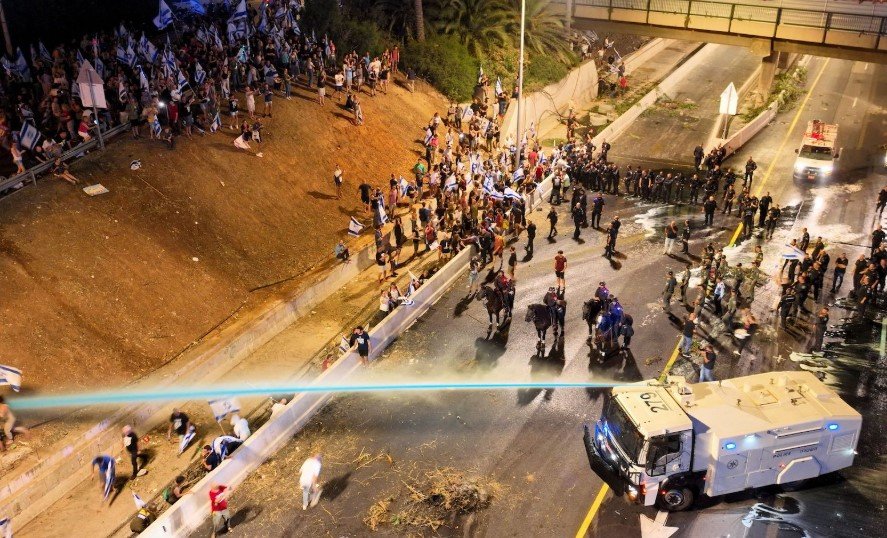Dozens of Australian Israelis gathered outside the Australian embassy in Tel Aviv on September 5, 2025, to protest their home country’s plan to recognize a Palestinian state. Protesters accused Prime Minister Anthony Albanese and Foreign Minister Penny Wong of rewarding terrorism after the Hamas attacks of October 7, 2023, amid rising tensions between Australia and Israel.
Background on Australia’s Palestine Decision
Australia’s government announced in August 2025 that it would recognize a Palestinian state, a move that sparked widespread debate. This decision came after months of pro-Palestinian rallies across Australian cities, with thousands demanding action on the Gaza conflict.
Officials in Canberra stated the recognition aims to support a two-state solution and promote peace in the Middle East. However, critics argue it ignores ongoing security threats from groups like Hamas.
The announcement strained diplomatic ties with Israel. Israeli leaders, including Prime Minister Benjamin Netanyahu, publicly criticized Albanese, calling the move politically motivated.
Recent polls show mixed opinions among Australians. About one in three believe the recognition is too soon or won’t make a difference, according to surveys from late August 2025.

Details of the Tel Aviv Protest
Around 36 protesters, many dual Australian-Israeli citizens, waved Australian and Israeli flags during the rally. They chanted phrases like “Am Yisrael Chai” and “Protect your mates, no terror state” to express their frustration.
Organizers highlighted violent incidents against Jewish communities in Australia, such as the arson attack on a Melbourne synagogue in 2024, which authorities recently blamed on Iranian agents.
One speaker, Lisa Segelov, described how Jews in Australia now fear showing their faith openly, a stark change from the tolerant society she knew growing up.
Drivers passing by honked in support, showing some local backing for the protesters’ message.
The event lasted about an hour, with participants calling for Australia to reconsider its stance and address rising antisemitism at home.
Reactions from Both Sides
Australian officials have defended the recognition as a step toward justice and stability. Foreign Minister Wong emphasized that it aligns with international efforts to resolve the Israeli-Palestinian conflict.
In contrast, Israeli officials revoked visas for some Australian representatives to the Palestinian Authority in August 2025, escalating the diplomatic row.
Pro-Palestinian groups in Australia praised the decision, organizing massive marches in cities like Sydney and Melbourne. Over 300,000 people joined nationwide rallies in late August 2025, demanding sanctions on Israel.
Jewish organizations in Australia expressed disappointment, urging the government to prioritize fighting antisemitism.
Social media buzzed with opinions. Posts on platforms like X showed divided sentiments, with some users supporting the protesters and others backing Palestine recognition.
Broader Implications for Australia-Israel Ties
The protest highlights deepening divisions in Australia’s foreign policy. Once strong allies, the two nations now face strained relations over issues like arms exports and Gaza aid.
Australia supplies parts for F-35 jets used by Israel, drawing criticism from activists who call for an arms embargo.
Diplomatic fallout includes Israel’s scrutiny of Australian visa applications, affecting travel and business ties.
Experts predict this could influence upcoming elections in Australia, where voter opinions on the Middle East are split.
- Key factors straining ties: Recognition of Palestine, rising antisemitism reports, and differing views on Hamas.
- Potential outcomes: Increased sanctions calls, shifts in trade, or renewed peace talks.
Impact on Australian Jewish Communities
Jewish Australians report feeling more unsafe since October 2023. Incidents of vandalism and harassment have risen by 300 percent in some areas, based on community reports from 2025.
Many dual citizens, like those at the Tel Aviv rally, question returning home. One protester said Australia no longer feels like a safe haven.
Support networks have formed, with groups organizing vigils and advocacy campaigns.
Schools and synagogues have increased security measures in response.
Global Context and Similar Protests
Similar rallies have occurred worldwide. In the US, activists protested outside embassies demanding arms embargoes on Israel.
Australia’s move follows recognitions by countries like Spain and Ireland in 2024, part of a growing international push.
| Country | Date of Palestine Recognition | Key Reason |
|---|---|---|
| Spain | May 2024 | Support for two-state solution |
| Ireland | May 2024 | Response to Gaza crisis |
| Australia | August 2025 | Promote peace amid protests |
| Norway | May 2024 | Align with EU efforts |
This table shows how Australia’s decision fits into a broader trend.
The Tel Aviv protest underscores global tensions over the issue.
What Happens Next
Analysts expect more demonstrations in coming weeks, both in Israel and Australia. Diplomatic talks may resume to ease tensions.
For now, the recognition stands, but its long-term effects remain unclear.
Share your thoughts on this developing story in the comments below, and spread the word by sharing this article with friends who follow international news.
